(dt. AKADEMIEVORLESUNG „ERNÄHRUNGSWENDE – CHANCEN UND HERAUSFORDERUNGEN“)
A fundamental transformation of our food system is needed to ensure a healthy and sustainable nutrition for everyone.
Such food transition offers significant opportunities for the health of the global population, all living organisms and our planet. At the same time, it is associated with major challenges: We must ensure the quality and availability of food. Political scope for action must be utilized in order to promote changes in consumer behavior at an individual and societal level. Concertized efforts by science, politics, business and society are necessary for this transformation to succeed.
Further information on the series and the individual events
The events were recorded. Videos can be viewed here.
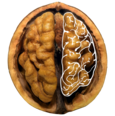
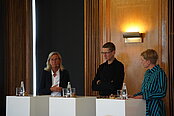
(dt. Warum machen Gehirne dick?)
ACADEMY LECTURE “FOOD TRANSITION - OPPORTUNITIES AND CHALLENGES” (III/III)
Overweight, obesity and other diet-related chronic diseases are challenging healthcare systems worldwide. Our brain not only regulates food intake and metabolism, but also our eating habits. How can we change cherished habits and effectively implement a healthy diet in disease prevention?
Pediatrician Annette Grüters-Kieslich provided insights into everyday clinical practice with overweight and obese patients and presents current treatment and prevention options, ranging from nutritional advice and gastric reduction to semaglutide injections. Neurobiologist Martin Korte elaborated on the evolution and function of our brain in relation to nutrition, learning and behavioral changes. Moderated by Constanze Bickelmann, they discussed promising approaches in the context of a nutrition transition.
The event was recorded. The video recording can be viewed here.
(dt. Die Zukunft unserer Nahrungsmittel in Zeiten globaler Krisen)
ACADEMY LECTURE “FOOD TRANSITION - OPPORTUNITIES AND CHALLENGES” (II/III)
On May 13th 2025, Ralph Bock, Benjamin Bodirsky and Harald von Witzke, moderated by Constanze Bickelmann, discussed the following question: how can the agri-food system of the future deal with an increasing food demand, among others due to a growing world population, with environmental problems such as nitrogen pollution, or with global conflicts.
Further informationen on the event and the Academy Lecture
The event was recorded. The video recording can be viewed here.
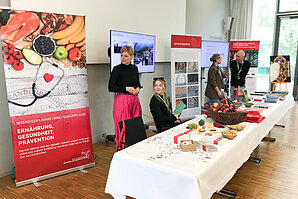
On May 10th, 2025, the research institutions of the Potsdam Science Park invited to the Potsdam Science Day, taking place at the Brandenburg Main State Archive, the Fraunhofer Campus, the Max Planck Campus and the University of Potsdam. Together with around 40 research institutions and universities, a varied program with interactive experiments, exciting lectures, games and fun hands-on activities awaited interested visitors.
The IAG was also represented by a booth and by Constanze Bickelmann and Emil von Lossow.
(dt. Die Ernährung der Zukunft: Gesund und nachhaltig – geht das zusammen?)
ACADEMY LECTURE “FOOD TRANSITION - OPPORTUNITIES AND CHALLENGES” (II/III)
As part of a three-part Academy Lecture, on April 15th, 2025, Ute Mons and Tilman Grune, moderated by Constanze Bickelmann, discussed how a nutrition transition and a successful disease prevention can be promoted. While at the same time our environment is protected. With a welcoming address by Academy President Christoph Markschies and an introduction by IAG spokesperson Ralph Bock.
Further information about the event, the series and the registration
The event was recorded. The video recording can be viewed here.
April 9th to 11th, 2025
As part of the BBAW project “The Role of National Academies in Promoting Urban Health”, a summit with around 90 international experts and young scientists from 34 countries as well as almost 200 participants took place at Herrenhausen Palace in Hanover in April. The aim was to jointly discuss how the global network of national science academies can contribute to developing and implementing solutions to the challenges of urban health. IAG members Annette Grüters-Kieslich, Detlev Ganten and Georg Seifert were also present.
Salon Sophie Charlotte 2025 took place under the topic “Metamorphoses” on January 18th at the BBAW
As part of the Salon Sophie Charlotte, IAG member Peter von Philipsborn (Chair of Public Health and Health Services Research, Ludwig-Maximilians-Universität München) gave a lecture entitled „Das globale Ernährungssystem: Wandlung und Transformation für Gesundheit und Nachhaltigkeit" (“The global food system: change and transformation for health and sustainability”).
Our diet has changed significantly over the past 100 years. This process has had a positive impact on our health and quality of life, but has also brought with it health, environmental, planetary and ethical challenges. As a result, there have been calls in science, politics and society for a fundamental transformation of the global food system. However, critical voices that want to stick to familiar ways of eating and living and business models have also been raised. How can a nutrition transition towards greater health and sustainability succeed as a project for society as a whole?
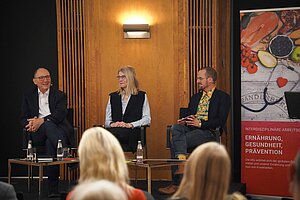
How good is "organic" for people and nature? (dt. Wie gut ist „Bio“ für Mensch und Natur?)
What exactly are organic products? How healthy and sustainable is organic food? These questions were discussed by Urs Niggli (agroecology.science, Aarau) and IAG member Hermine Mitter (Department of Environmental Systems Sciences, Uni Graz) on November 7th, 2024 at the BBAW. IAG member Benjamin Bodirsky (Potsdam Institute for Climate Impact Research) moderated the debate which focused on the advantages and disadvantages of organic food production and consumption.
A video recording of the panel discussion can be viewed here.
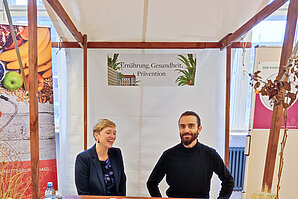
In gesunden Städten leben – in Städten gesund leben (Living in healthy cities - living healthily in cities)
The annual joint event of all science academies that are members of the Academies' Union in 2024 was dedicated to the topic “Healthy Cities”.
As part of the comprehensive program, a 'Market of Science' took place at Berlin-Brandenburg Academy of Sciences and Humanities (BBAW) on November 6th, 2024. The IAG Health, Nutrition and Prevention was among the many projects that gathered here for a dialog with the interested public.
What kind of diet is actually healthy and sustainable for humans, animals and the environment? This question, among others, was explored by Constanze Bickelmann und Emil von Lossow together with guests and visitors through interactive quiz-activities.
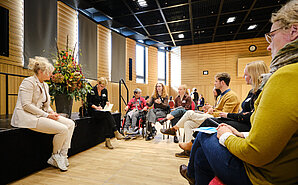
Das sind wir ihnen schuldig! Kindergesundheit auf sichere Füße stellen (We owe it to them! Putting children's health on a firm footing)
Constanze Bickelmann presented a topic table at the 21st Berlin State Health Conference, contributing the research topics of the IAG. You can find a review here.
Finissage of the exhibition "Von der Krafft und Würckung: Pflanzen als Nahrungs- und Heilmittel in Hieronymus Bock's 'Kreütter Buch' (1539) neu gelesen"
On Tuesday, July 16th, 2024, the finissage of the exhibition "Von der Krafft und Würckung: Pflanzen als Nahrungs- und Heilmittel in Hieronymus Bock's 'Kreütter Buch' (1539) neu gelesen" took place at the Berlin-Brandenburg Academy of Sciences and Humanities from 6 to 9 pm.
After a welcome address by the President of the Academy, Christoph Markschies, IAG member Philip van der Eijk provided insight into ancient knowledge about plants and their effects on human health. IAG spokesperson Ralph Bock gave a lecture on the similarities and differences in plant research in the 16th century and today. Ralph Bock also offered visitors a chance to have a look at an orginal 'Kreütter Buch' from the 16th century and guided a tour through the exhibition.
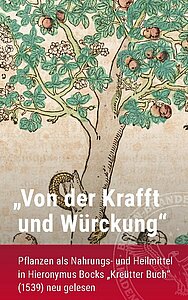
„Von der Krafft und Würckung“: Pflanzen als Nahrungs- und Heilmittel in Hieronymus Bocks „Kreütter Buch“ (1539) neu gelesen"
What did doctors and plant researchers know about various plant species in the 16th century. How should this knowledge be evaluated in the context of today's research?
The exhibition of the IAG Nutrition, Health, Prevention in cooperation with the Max Planck Institute of Molecular Plant Physiology addresses these questions and can be visited in the hallway of the BBAW at Jägerstraße 22/23 (ground floor to 3rd floor) between January 20th and July 31th, 2024. You can also find an online version of the exhibition here.
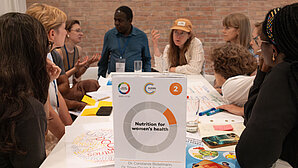
The fourth annual symposium, GLOHRA Day 2024, took place on Friday, 28 June 2024 in Berlin. The event featured the General Assembly, presentations from GLOHRA funded project teams and lots of networking opportunities for researchers in global health. It aims at facilitating exchange of research and policy of interest to global health researchers.
Together with Sören Ocvirk (TU Munich & German Institute of Human Nutrition Potsdam-Rehbruecke) and Britta Rutert (Brandenburg Medical School), Constanze Bickelmann lead an interactive discussion on the topic of "Nutrition for women's health" as part of the "Ask the Community" format.
At Leibniz Day on June 15th, 2024, in addition to the main program, there was space for BBAW projects and initiatives to present themselves and their research.
Visitors were invited to talk to
Annette von Stockhausen, head of the Academy's research project
“Die alexandrinische und antiochenische Bibelexegese in der Spätantike”, and
Constanze Bickelmann and to find out about the two research projects.
![[Translate to Englisch:] Ralph Bock führt Interessierte durch die Ausstellung (Foto von Tobias Lortzing) Bildnachweis: © Tobias Lortzing](/fileadmin/_processed_/c/4/csm_PXL_20240120_193117940.MP_294b856f73.jpg)

The Salon 2024 with the motto "Time" („Zeit“) took place on January 20th, between 6 and 12 pm at BBAW.
As part of the Salon, the exhibition die exhibition (Ausstellung) „Von der Krafft und Würckung": Pflanzen als Nahrungs- und Heilmittel in Hieronymus Bocks ‚Kreütter Buch' (1539) neu gelesen by the IAG Nutrition, Health, Prevention in cooperation with the Max Planck Institute of Molecular Plant Physiology has opened.
After an introduction to the exhibition by IAG spokesperson Ralph Bock, IAG member Philip van der Eijk joined Annette Heinrich (classical philologist, Einstein Center Chronoi) and Giouli Korobili (classical philologist, Einstein Center Chronoi) to discuss "Time and the human body: medical and philosophical perspectives from antiquity to the early modern period" („Zeit und der menschliche Körper: Medizinische und philosophische Perspektiven von der Antike bis in die frühe Neuzeit"). This was followed by further lectures by IAG members Harald von Witzke ("Changing times in nutrition and agriculture: A brief history of hunger" - „Zeitenwenden in Ernährung und Landwirtschaft: Eine kurze Geschichte des Hungers") and Annette Grüters-Kieslich ("Is the time of the obesity pandemic over?" - „Ist die Zeit der Adipositas-Pandemie vorbei?").
Program by the IAG Nutrition, Health, Prevention
Post about the IAG program on Instagram
On October 30th, 2023, pediatrician Annette Grüters-Kieslich (Deputy spokesperson of the IAG, Charité -Universitätsmedizin Berlin), psychologist Ralph Hertwig (Max Planck Institute for Human Development) and legal expert Johanna Wolff (University of Osnabrück) discussed if, given the ongoing obesity pandemic, the German government may or should interfere in aspects of our nutrition (dt. Darf oder sollte der Staat sich in unsere Ernährung einmischen?).


Nutrition in Global Health Research
On October 14, 2023, a non-public workshop on the special role of nutrition in the field of global health research took place at BBAW. The workshop, organized by Esther Evang (University of Bonn), Sören Ocvirk (TU Munich & German Institute of Human Nutrition Potsdam-Rehbruecke) and Constanze Bickelmann and funded by the German Alliance for Global Health Research (GLOHRA), aimed to connect scientists from different disciplines and institutes and to support young researchers.


Following the celebrations of Leibniztag 2023, the Berlin-Brandenburg Academy of Sciences and Humanities participated in the Long Night of Science (Lange N8 der Wissenschaften) on June 17th.
IAG member Andreas Diefenbach held a lecture on the topic "We are what we eat: On the connection between nutrition, microbiome and activation of the immune system" at 7 pm in the Einstein-Saal.
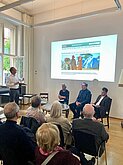
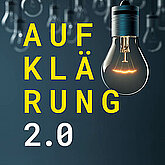
In congruence with the annual theme 23|24 "Project: Enlightenment!", the theme of the Salon 2023 was "Enlightenment 2.0".
The program of the Salon, as well as the entire annual theme of the BBAW, refered to the 300th birthday of Academy member Immanuel Kant on April 22nd, 2024: The annual theme focuses on Kant's philosophy, his biography and his professional achievements. Moreover, "Enlightenment" is studied from a historical and current perspective, as an epoch and a project, in a highly interdisciplinary way. The Salon was primarily concerned with current perspectives.
The IAG Nutrition, Health, Prevention was represented at Salon Sophie Charlotte by its spokespersons in a panel discussion on the future of our diet, as well as in open conversations centered around nutrition.
![[Translate to Englisch:] Martin Korte beim Vortrag Bild: Martin Korte beim Vortrag](/fileadmin/_processed_/a/e/csm_DSC_0037_edcf2f9403.jpg)
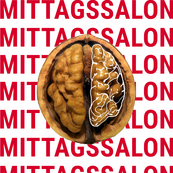
Can you eat yourself smart? (dt. Kann man sich klug essen?)
At the beginning of every month, the Mittagssalon of the Berlin-Brandenburg Academy of Sciences and Humanities presents scientists and research topics from the Academy: timely & informative, entertaining & surprising, digestible & tasty. We wish you good entertainment and Bon Appétit!
On March 1st, 2023, neurobiologist Martin Korte (Academy member and member of the IAG, University of Braunschweig) explained to what extent nutrition keeps our brains healthy in old age and is able to, for example, reduce the risk of Alzheimer's disease in old age.